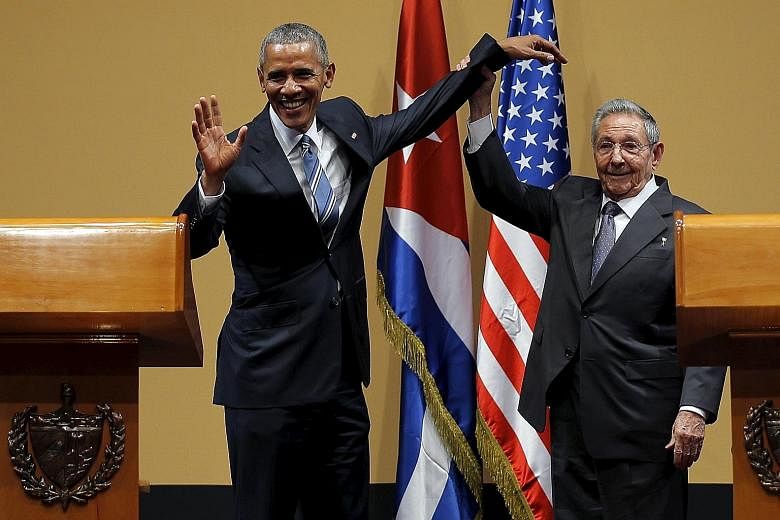HAVANA • US President Barack Obama has pushed Cuba to improve human rights during his historic visit to the Communist-led island, publicly sparring with Cuban President Raul Castro, who showed flashes of anger and hit back at United States "double standards".
Mr Obama praised Mr Castro for openly discussing their differences but he said a "full flowering" of the relationship would happen only with progress on the issue of rights.
"In the absence of that, I think it will continue to be a very powerful irritant," Mr Obama said in a televised joint news conference with Mr Castro on Monday that began with jokes but was tense at times.
"America believes in democracy. We believe that freedom of speech and freedom of assembly and freedom of religion are not just American values but are universal values," he said.
Mr Castro countered that no country meets all international rights but appeared uncomfortable as he made the rare step of taking questions from journalists in a country where the media is state controlled.
Mr Castro, an army general who became president when his ailing older brother, Fidel, retired in 2008, was clearly irritated when asked by reporters about political prisoners in jail in Cuba.
"Tell me now. What political prisoners? Give me a name, or the names," Mr Castro said. "And if there are these political prisoners, they will be free before nightfall." Cuba says it has no political prisoners and that dozens listed by dissident groups are common criminals.
Mr Ben Rhodes, a senior Obama aide, later insisted Cuba has political prisoners and said the US government had shared lists of them with Cuba. He said Cuba has shifted from long prison terms to short-term detentions of political opponents.
Mr Obama, the first US president to visit Cuba in 88 years, agreed in 2014 to improve relations with the former Cold War foe but he is under pressure at home to push Mr Castro's government to allow political dissent and to further open its Soviet-style economy. He said the two sides would hold talks on human rights in Havana later this year.
Opponents say Mr Obama has given away too much as he improves ties, with too little from Mr Castro in return.
Mr Castro said Cuba has a strong record on rights such as health, access to education and women's equality. His government criticises the US on racism, police violence and the use of torture at the Guantanamo Bay naval base in Cuba.
Mr Castro said the US needs to lift its 54-year-old trade embargo on the island and hand back the Guantanamo Bay base to Cuba.
Mr Obama did not respond to the demand on Guantanamo Bay but said he was optimistic about the elimination of sanctions against Cuba: "The embargo's going to end. When, I can't be entirely sure," he said. A clutch of business deals timed to coincide with the visit appeared to show the Obama strategy was bearing commercial fruit, despite Republican opposition to rescinding the embargo.
In an awkward moment, as the news conference ended, Mr Castro lifted Mr Obama's arm in the air as if to form a victory salute. Mr Obama resisted, letting his hand hang limp rather than form a fist.
REUTERS

